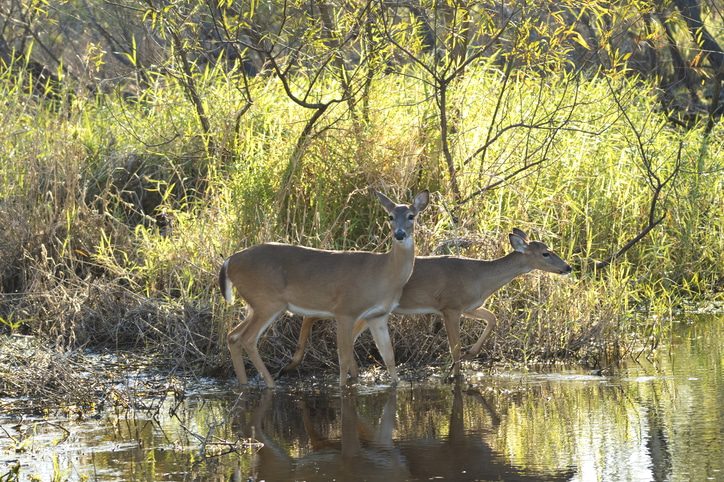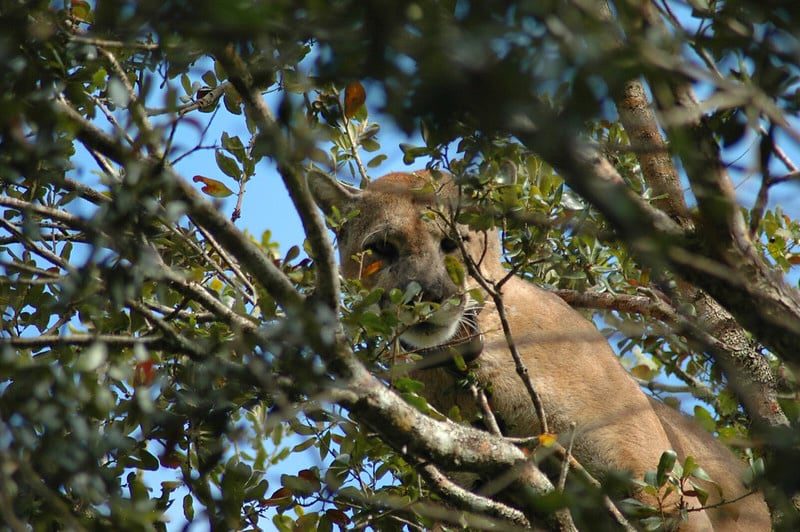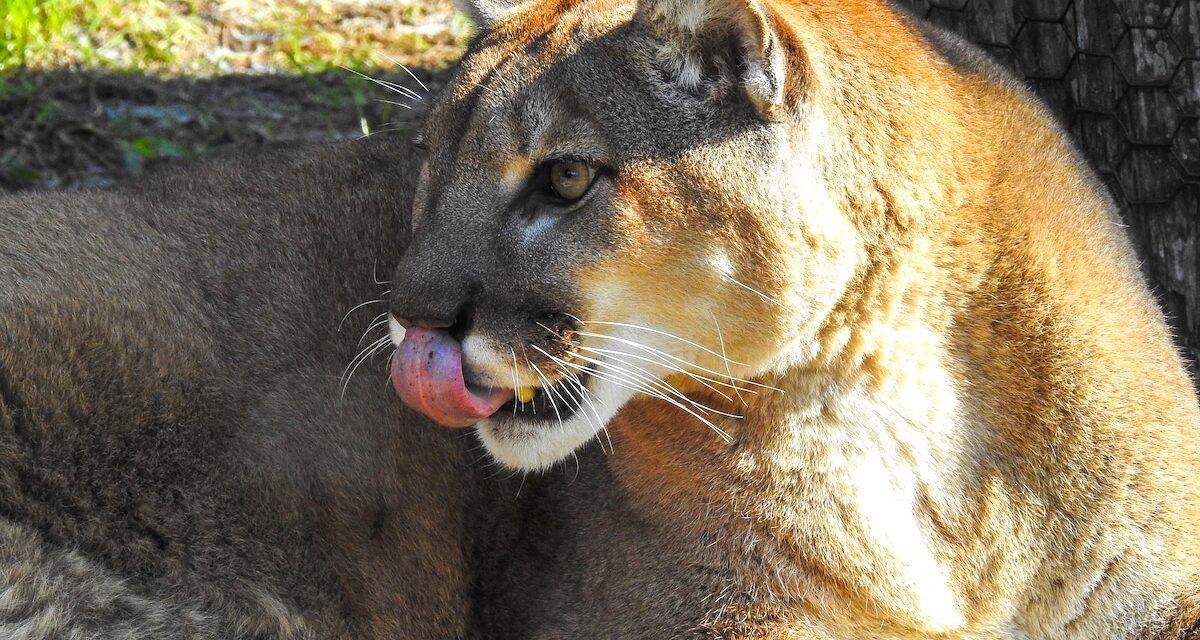A
Florida
panther
at
Gatorland
in
Orlando,
Florida.
Kirsty
Nadine
/
iStock
/
Getty
Images
Plus
Why
you
can
trust
us
Founded
in
2005
as
an
Ohio-based
environmental
newspaper,
EcoWatch
is
a
digital
platform
dedicated
to
publishing
quality,
science-based
content
on
environmental
issues,
causes,
and
solutions.
Florida’s
Miccosukee
Tribe
is
seeking
to
purchase
important
Tribal
lands
to
create
a
corridor
for
wildlife
conservation
as
part
of
a
partnership
agreement
with
the
Florida
Wildlife
Corridor
Foundation.
The
corridor
will
connect
18
million
acres
of
contiguous
privately
owned
and
state
wilderness
that
are
the
habitat
of
endangered
species
like
Florida
panthers
and
Key
deer,
reported
The
Guardian.
“The
Miccosukee
Tribe
of
Indians
of
Florida
have
stewarded
the
lands
and
waters
of
Florida
since
time
immemorial.
The
entirety
of
this
land,
and
her
flora
and
fauna,
have
been
shaped
by
successive
generations
of
our
people.
Our
collective
Indigenous
Knowledge
offers
a
unique
perspective
informed
by
this
deep
and
historic
relationship
to
the
lands
and
waters
of
the
National
Wildlife
Refuge
System
that
lie
within
our
traditional
lands,”
said
Talbert
Cypress,
chair
of
the
Miccosukee
Tribe,
in
a
press
release
from
the
United
States
Fish
and
Wildlife
Service
(FWS).
During
the
Seminole
Wars
two
centuries
ago,
Tribal
members
sought
to
protect
the
Everglades
and
avoid
banishment
by
government
forces
to
Indian
territories
in
what
is
now
Oklahoma.
[embedded content]
In
January,
the
Miccosukee
Tribe
entered
into
an
agreement
with
FWS
for
co-stewardship
of
national
wildlife
refuges
in
South
Florida.
The
agreement
means
Miccosukee
citizens
can
once
again
hunt,
fish,
gather
culturally
significant
and
medicinal
plants
and
conduct
ceremonies
in
the
refuges
adjacent
to
traditional
Miccosukee
lands
and
within
the
Greater
Everglades.
In
the
wake
of
the
Trump
administration’s
slashing
of
federal
funds
for
conservation
projects,
the
Miccosukee
Tribe
has
stepped
in
to
fulfill
what
it
feels
is
a
“moral
obligation”
to
protect
their
sacred
lands
and
the
plants
and
animals
found
there.

Key
deer
in
a
Florida
state
park.
Bilanol
/
iStock
/
Getty
Images
Plus
“We
have
a
constitutional
duty
to
conserve
our
traditional
homelands,
the
lands
and
waters
which
protected
and
fed
our
tribe
since
time
immemorial,”
Cypress
said,
as
The
Guardian
reported.
“[But]
we’ve
seen
some
sort
of
hesitancy
a
lot
of
times
to
commit
to
projects
because
of
the
erratic
nature
of
how
the
government
is
deciding
to
spend
their
money
or
allocate
money.”
The
agreement
was
announced
during
a
corridor
stakeholders’
summit
last
week
in
Orlando.
It
came
as
a
Native
American
Fish
and
Wildlife
Society
(NAFWS)
study
found
that
60
percent
of
Tribes
recognized
by
the
federal
government
have
lost
over
$56
million
in
federal
funding
since
President
Donald
Trump
took
office
for
his
second
term.
Though
Tribes
have
their
own
independent
governments,
the
U.S.
has
legal
trust
responsibilities
to
protect
rights
set
out
in
Tribal
treaties
regarding
lands,
assets
and
resources,
a
press
release
from
The
Wildlife
Society
(TWS)
said.
“These
services
are
part
of
what
we
receive
in
lieu
of
all
of
the
years
of
what
we
gave
up
—
our
land,
our
resources
and
sometimes,
unfortunately,
our
culture
and
language,”
said
Executive
Director
of
NWFWS
Julie
Thorstenson
in
the
TWS
press
release.
“These
are
not
things
that
are,
in
our
mind,
something
that
is
really
negotiable.”

A
Florida
panther
in
a
tree
in
Naples,
Collier
County.
Tim
Donovan
/
Florida
Fish
and
Wildlife
As
government
funding
has
disappeared
and
federal
land
stewardship
agreements
face
an
uncertain
future
due
to
the
Trump
administration’s
attacks
on
the
National
Park
Service,
Cypress
said
Tribal
leaders
had
reassessed
their
work
with
other
partners.
“For
good
reason,
my
predecessors
had
more
of
a
standoffish
approach.
They
went
through
a
lot
of
the
areas
where
they
did
deal
with
conservation
groups,
federal
agencies,
state
agencies,
pretty
much
not
including
them
in
conversations,
or
going
back
on
their
word.
They
just
had
a
very
different
approach
to
this
sort
of
thing,”
Cyprus
explained,
as
reported
by
The
Guardian.
“My
administration
has
taken
more
of
a
collaborative
approach.
We’re
engaging
with
different
organizations
not
just
to
build
relationships,
but
fix
relationships
that
may
have
gone
sour
in
the
past,
or
were
just
non-existent.”
Lawmakers
established
the
Florida
Wildlife
Corridor
in
2021
and
have
preserved
approximately
10
million
acres
thus
far,
with
an
additional
eight
million
considered
“opportunity
areas”
that
need
protection.
Environmental
groups
have
warned
that
there
is
still
the
potential
for
large
areas
to
be
lost
to
development.
The
Florida
legislature
has
been
considering
corridor
funding
cuts
to
balance
state
spending,
and
has
encouraged
commercial
partnerships
and
investment.
The
Tribe
has
already
established
a
direct
or
collaborative
stewardship
with
nearly
three
million
acres
in
Biscayne
and
Everglades
National
Parks,
as
well
as
Loxahatchee
National
Wildlife
Refuge.
Cypress
said
the
Tribe
was
working
on
identifying
and
prioritizing
lands
inside
the
corridor
that
had
historical
significance.
“Financially,
the
tribe
will
invest
some
money,
but
we’ll
also
be
instrumental
in
finding
investors,
partners
interested
in
the
same
thing,
which
is
to
conserve
as
much
of
our
natural
habitat
as
possible
while
making
room
for
growth
and
development,”
Cypress
said.
“We’ve
shown
we
can
do
it
in
a
sustainable
way,
and
our
voice
can
help
in
shaping
the
future
of
Florida
as
far
as
development
goes
because
once
a
lot
of
the
land
gets
developed
we’re
not
going
to
get
it
back.
We
need
to
do
it
in
a
way
where
we
benefit
not
just
ourselves
in
the
present,
but
for
generations
in
the
future
as
well.”
Subscribe
to
get
exclusive
updates
in
our
daily
newsletter!
By
signing
up,
you
agree
to
the
Terms
of
Use and Privacy
Policy,
and
to
receive
electronic
communications
from
EcoWatch
Media
Group,
which
may
include
marketing
promotions,
advertisements
and
sponsored
content.





